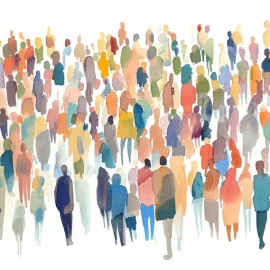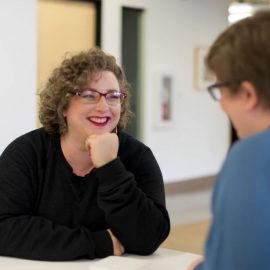

This article is an excerpt from the Shortform book guide to "Bittersweet" by Susan Cain. Shortform has the world's best summaries and analyses of books you should be reading.
Like this article? Sign up for a free trial here.
How can accepting your mortality benefit you? How can you learn to embrace mortality?
According to author Susan Cain, accepting your mortality can actually benefit you by strengthening your connections with others. In her book Bittersweet, she explores how accepting your life’s impermanence gives it more meaning and provides strategies for increasing your awareness of impermanence.
Read on to learn about the importance of accepting your mortality and how to do it, according to Cain.
The Importance of Accepting Your Mortality
Author Susan Cain argues that accepting your mortality may strengthen your connections with others. Studies found that people close to (and thus highly aware of) death seek to deepen the connections they already have with others, rather than form new ones. This means they spend more time with the people they love and work to improve the quality of their relationships.
(Shortform note: According to research, focusing on social activities and meaningful connections is the best way to live a happy life for people of any age, not just those with limited time. We get the most joy from activities that strengthen our bonds with friends and family or benefit our community in some way. Additionally, living a meaningful, socially fruitful life that we enjoy plays an important role in increasing our longevity—people with satisfying relationships, strong emotional well-being, and a sense of purpose and engagement live longer than people who feel unhappy and disconnected.)
In contrast, young, healthy people (who typically try to avoid acknowledging their mortality) tend to feel like their time is unlimited. Therefore, they frequently start new relationships rather than developing the ones they already have. Likewise, they spend their time learning new information and building new skills while planning for their future, rather than searching for deeper meaning in their present daily life.
(Shortform note: Young people often spend their energy developing new relationships because they’re transitioning from spending time with their inherited family (the family they were born into or grew up with) to seeking a chosen family (people they’ve chosen to support, love, and care for regardless of blood or marriage ties). Unfortunately, when young people are still searching for their chosen family, they might lack the meaningful connections that older people have. This can leave them susceptible to loneliness. They’re often homesick, alone while making important life decisions, and separated from the communities they know, all of which contribute to feelings of isolation.)
| Why Focusing on the Future Isn’t Always a Bad Thing Having a future-focused mindset isn’t necessarily a bad thing: Studies indicate that thinking about the future can help us in several important ways. First, it makes us more likely to choose a long-term, delayed reward over smaller, more immediate rewards. Building new skills that’ll help us achieve a future goal, as young people often do, is one possible example of this. Additionally, imagining we’ll do something positive in the future (like achieving a goal or helping someone in need) makes us more likely to actually do it. Finally, future prospection can help people with depression and trauma to heal—thinking about what they want from the future allows them to break free from their struggles in the past and present. |
How to Increase Your Impermanence Awareness
Luckily, Cain asserts that you don’t have to be close to death to access the benefits of impermanence awareness. She names three strategies for accepting your mortality and increasing your impermanence awareness:
1) Study religious and philosophical traditions that deal with death, such as ancient Stoic writings on mortality. They require us to reflect on the fact that we’ll all die someday, so we should appreciate the time we’re given.
(Shortform note: To explore Stoic writings on death, ancient Roman emperor Marcus Aurelius’s Meditations might be a good place to start. As well as advocating for making the most of every day, Aurelius argues that we shouldn’t fear the death of the flesh because our bodies are the least important part of us. Our spirits and especially our minds are most important.)
2) To accept your mortality, spend more time thinking deeply about death. You can do this by paying attention to ephemerality in nature, like the setting sun or a sudden storm. (Shortform note: You can intimately understand ephemerality in nature and meditate on impermanence through gardening. When you tend to a garden, you’re constantly surrounded by the life and death of plants, changing with the seasons. Plants also have good days and bad days like us. Growing them can remind you that nothing lasts forever, whether it’s good or bad.)
3) Appreciate people while they’re here. Spend time with older people and listen to their stories—this can remind you that they won’t always be around to tell them. (Shortform note: As well as helping you to accept your mortality and increase your impermanence awareness, listening to the stories of your elders can benefit the storyteller. For one, engaging with and relaying their past memories can help keep their minds sharp and active. Additionally, the act of telling stories can improve communication between elders and their caregivers. This reduces stress on both sides, preventing conflict and caregiver burnout. Finally, sharing life stories contributes to increased self-worth and a sense of purpose.)
Exercise: Reflect on Impermanence in Your Life
Cain explores the benefits of bittersweet states, and she describes many methods for accessing them in everyday life. Spend some time considering your relationship to one of these states—accepting your mortality.
- How much do you consider impermanence in your everyday life? (For example, you might think about your mortality regularly; or, it might only cross your mind occasionally.)
- What has encouraged or discouraged you from accepting your mortality? (For example, maybe a spiritual practice has encouraged you to think about it, or you’ve been discouraged by your fear that you’ll lose the people you love.)
- How do your views on mortality affect your current choices? (For example, maybe you avoid spending time with your family because you feel that if you isolate yourself from them, losing them won’t hurt as much.)
- Which strategies for accessing impermanence awareness and accepting your mortality might work for you? Why? (For example, maybe meditating on impermanence through nature appeals to you because you already enjoy spending time in nature.)

———End of Preview———
Like what you just read? Read the rest of the world's best book summary and analysis of Susan Cain's "Bittersweet" at Shortform.
Here's what you'll find in our full Bittersweet summary:
- Why you should embrace a bittersweet disposition in life
- How sadness has the power to foster creativity and empathy
- How to accept your own mortality and the impermanence of life






